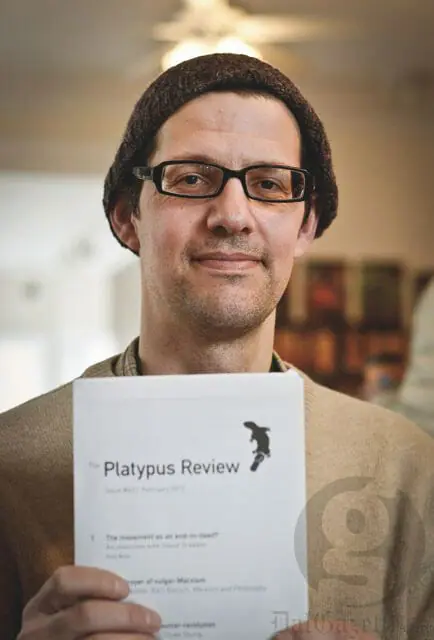
What do the American anti-war movement, Occupy Wall Street, the sexual liberation movement, unions and an endangered semi-aquatic mammal from Australia all have in common?
The Platypus Affiliated Society at Dalhousie has been organizing events for the past six months, discussing the history of the political left and answering that question.
Motivated by a sense that the left is disoriented, the Platypus Society draws out the connections and points of disagreement between the various movements on the left-wing today and their historical predecessors, in the hopes of dispelling “ideological murkiness,” according to the website.
Andony Melathopoulos, Canadian coordinator of the Platypus Society and president of the Dal affiliate, hopes their work will prompt more thoughtful consideration about what it means to be on the left today.
On March 1, the group held a public interview between Herb Gamberg, a professor of sociology at Dal, and Tony Thomson from Acadia University, on the history of the New Communist movement in Halifax in the 1970s.
The society has organized six events this year with support from a variety of on-campus groups, such as the Contemporary Studies Society at the University of King’s College, the Dal Women’s Studies department and NSPIRG. Some topics have included “Does Marxism Even Matter?,” “What is the #Occupy Movement?” and a film screening mini-series featuring Wall Street: Money Never Sleeps.
The group also meets twice weekly: once as a reading group, discussing the history of Marxist theory, and once to talk politics. The readings, which include texts from Hegel, Rousseau, Adorno and Horkheimer, are available online at the Platypus website.
The Platypus Society at Dal has been “trying to create the space where you can think critically. A space in which you don’t have to simply defend your positions but take them out and have a look at them,” says Melathopoulos.
“This isn’t your uncle’s turkey dinner,” he says. “You don’t have to worry and you don’t have to take your position for granted.”
It’s a place where students can hear a conversation that’s very different from what they’re used to, and where they can ask questions they’re not used to asking, says Melathopoulos.
For some, “it’s unclear why you would even need the category of the left at the moment,” he says. “I remember when we did our first event at Dal in September, we asked the question ‘What is the left?’ and the answer we got was, ‘Well, you support the CBC, healthcare and the unions.’”
Recently, movements such as Occupy Wall Street have rejected an association with the “traditional left.” But people have been announcing the death of the left for a long time, says Melathopoulos.
“If you understand the present in its historical context, you could recognize a left today,” says Melathopoulos.
In the case of Occupy, both the problem identified – macro-scale inequality – and the methodological debates in the movement itself, such as the problem of hierarchy, are not new, says Melathopoulos.
The Platypus Society believes that “if we understand the problem of the left as a historical one, that might help us in the present,” he says.
Melathopoulos doesn’t have a background in sociology or history. He’s a PhD student working with wild honeybees. He says the texts are “not that complicated if you just start reading them with an open mind.”
Founded in Chicago in 2006, the Platypus Society has chapters across the globe, including France, Korea, Greece and Toronto. The group publishes a monthly journal, *The Platypus Review*, which can be found in the atrium of the Killam and at cafés around Halifax. It has featured Noam Chomsky and Slavoj Žižek in the past.
The March issue contains an essay by former Dal student David Bush, writing on the Occupy movement.
As to the name, Marx’s friend and collaborator, Friedrich Engels, thought the platypus was a scheme cooked up by taxidermists in an attempt to discredit Darwin’s theory of evolution; such an animal was ridiculous and patently impossible in the light of natural history. The same is said of ‘the left’ today, says the Platypus Society.
And then Engels saw one.

Recent Comments